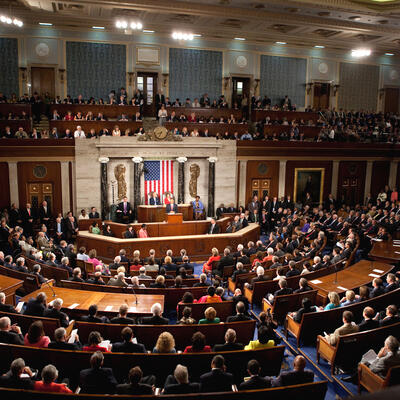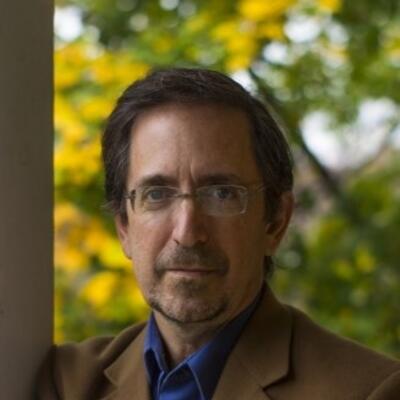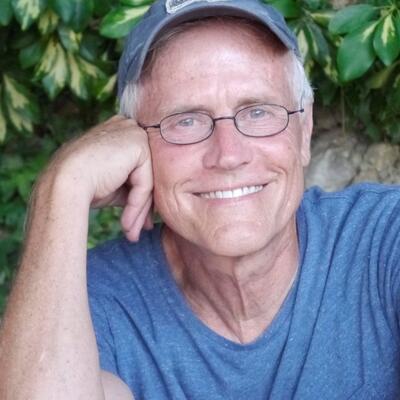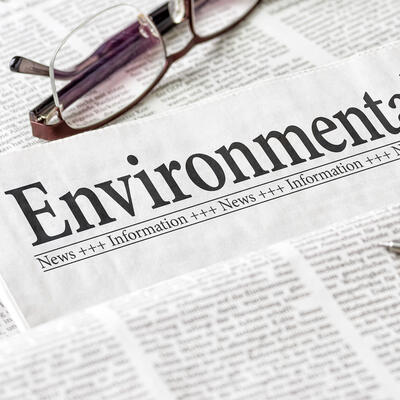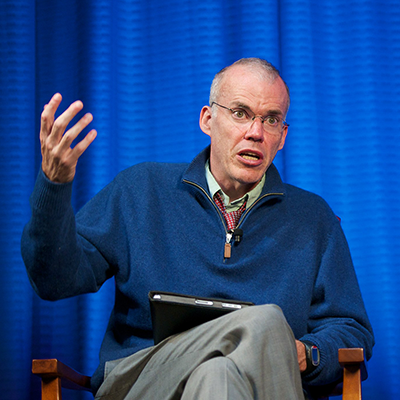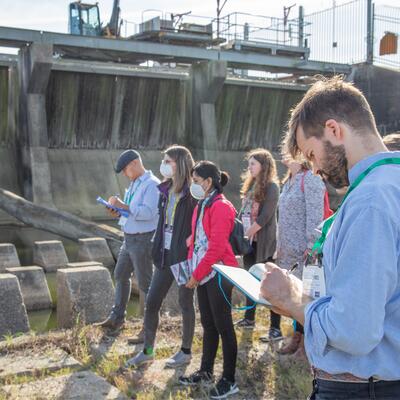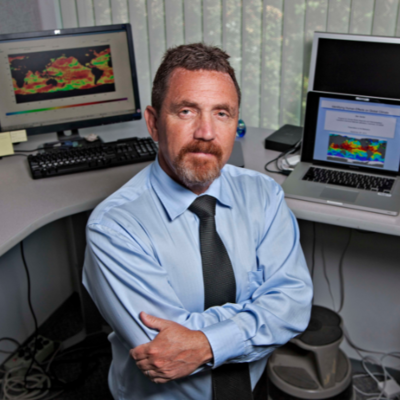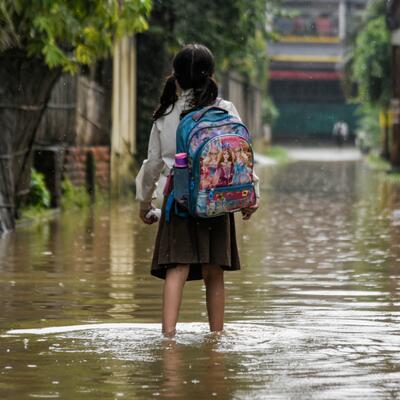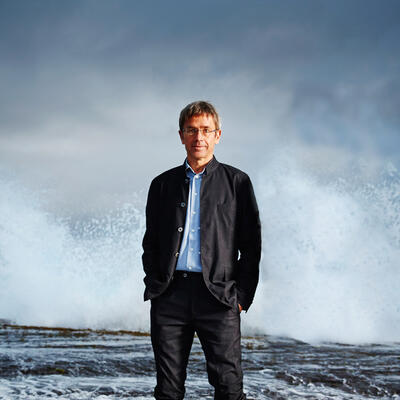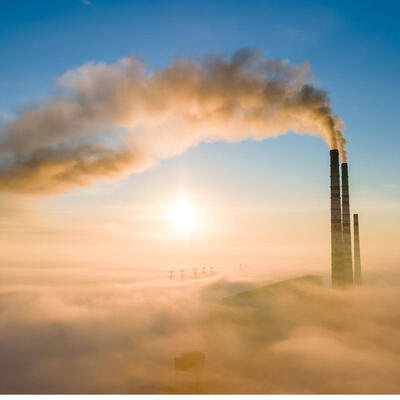Greg Dalton: Welcome to Climate One, a conversation about America's energy, economy and environment. To understand any of them, you have to understand them all. I'm Greg Dalton.
Today, we're discussing climate news, science and advocacy. Twenty-five years ago, Congress held the first hearings on human-caused climate change. Since then, scientific knowledge, public understanding and government policy have all advanced but not far or fast enough to ward off the impacts of rising carbon pollution. Over the next hour, we will talk about the climate story with our live audience at the Commonwealth Club of California.
We're pleased to be joined by two veteran writers who have been covering this story.
Paul Hawken is an entrepreneur and author. His most recent book is
Blessed Unrest: How the Largest Social Movement in History Is Restoring Grace, Justice, and Beauty to the World. Andy Revkin writes the Dot Earth Blog for
The New York Times. He's authored several books including
The North Pole Was Here: Puzzles and Perils at the Top of the World. Please welcome them to Climate One. Thank you both for coming.
[Applause]
Andy Revkin, let's begin with you. I believe you started writing about climate in your first book in 1988. Tell us about the importance of that first congressional testimony when James Hansen laid out the facts. What happened?
Andy Revkin: Well, there was a lot going on that summer, the summer of 1988. It was Yellowstone that was on fire that summer, not Yosemite. The Midwest was having a scorching drought, parts of northern Europe were also in a record in heat wave. So you had the background of that. You had the success recently just before then of the Montreal climate, the Montreal Protocol on these other atmospheric threat from CFCs, and the science. And then you had Jim Hansen who is a scientist who's always a bit out ahead of everyone in terms of his assertions and conclusions about what was going on. And then you had Tim Wirth who is arranging a hearing, kept the windows open on hot days. So it was [crosstalk] –
Greg Dalton: Senator from Colorado.
Andy Revkin: Yeah. And it became a news story. And I did my first long piece that fall, a cover story on Discovery Magazine on the greenhouse effect. I had already been writing about the human-climate relationship. In the mid 80's, it was nuclear winter. During the Cold War there was this idea that if you had enough cities incinerated it would cool the climate. And some of the same people were using the models to look at that who were looking at the greenhouse effect as well. So I had already known all these scientists, but that was the first year it really kind of peeked. And then we went to sleep, of course, for a long time.
Greg Dalton: Well, Jim Hansen, he's been here. He talked about – he went and presented the facts. He thought, "Okay. Here's the concern. Here's some information." He went back to his lab and thought that action would follow.
Paul Hawken, that didn't happen.
Paul Hawken: No. One of the most frustrating things that the IPCC scientists have learned is that facts don't change people's minds. I mean, they think it should and it changes their minds but it doesn't change the public. In fact – and sometimes factual onslaughts can actually cause people to dig in to their own point of view, to their own framing of the world. And so what's happened is that in the absence of response, then people try to ratchet up the predictions, the prophecies, the dire consequences of climate change, which has very robust data and science to support it. So it's not wrong, but in the process of catastrophizing the future, they have created, in a sense, the resistance to it because they are now being catastrophized. Because if you say this and this and this is going to happen and then the deniers and other people would come back and say, "You are taking away our children's future, our security, our jobs. What you want is an elitist vision of the world." And what's lost in all that is the science.
Greg Dalton: And are you saying that scientists exaggerate the truth?
Paul Hawken: No. What I'm saying is that given the data and the success of IPCC reports, you get a successively more dire prediction of what's going to happen going forward even though the IPCC reports tend to be consensus-based and they actually tend to be conservative. So what we've seen is that after the report comes out, that actually the consequences or climate variability or volatility is actually greater than what was predicted.
Greg Dalton: Andy Revkin, do you think that some of the facts get overstated, that they perhaps get interpreted in their most extreme case by some scientists? Because there's a range of scenarios and they take sort of the worst-case scenario because they think they need to make a point to wake people up?
Andy Revkin: That has happened. Some scientists like some human beings who aren't scientists are very activists in their passions about an issue. And some people have downplayed the real uncertainties around some of the key factors related to global warning, the rate of sea level rise. We don't know whether it's going to be three feet, two feet. It's actually is extremely unlikely more than five or six feet by 2100, but how do you sort of convey that, the sense of urgency? How do you get people activated to decarbonize the growing energy menu for the world in the face of complexity? And that's been hard for some people to grapple with, so they tend to kind of go for the easy hit.
Sandy is us. There was that Business Week — “It's Global Warming” — stupid headline, which was very catchy but it didn't actually say anything. Sandy was not our doings. Sea level rise is partially our doing but the other aspects of that storm were very complicated. So overstating the case, I think, can be harmful.
Greg Dalton: So let's stay on that for a minute. I mean, Sandy…
Andy Revkin: And by the way, it's more of the media activists, NGO community that's done that than the scientists themselves.
Greg Dalton: All right. So Sandy happened with warm seas, high seas, warm seas, when water expands. So would you say there's a human contribution to Sandy? Not that –
Andy Revkin: Through sea level rise, yes, but the other aspects of the way that was portrayed are really hard to sell when you look at the science. We've had a declining rate of land falling hurricanes since the 19th century in the United States. So if you really think that global warming is hurricane perils in the United States, someone could make a counter-argument that there's been declining rates of landfalls of hurricane for storm, so where's your argument.
Greg Dalton: Right. What progress has been made since the first congressional testimonies in terms of general understanding? Twenty-five years, have we made any progress in terms of basic understanding of the science and public recognition,
Paul Hawken, of the basic climate situation?
Paul Hawken: Well, one thing that's gotten conflated is the core science, which was known in 1896, which is impeccable, irrefutable of why triatomic particles basically would radiate infrared radiation back to earth. I mean, there's water, CO
2 and nitrous oxide. No one has ever doubted that, no one has ever questioned it, not the most ardent denier has questioned that. That's physics. What has happened, of course, and people try to interpret, well, what is the consequence of increased heat. And we don't know. And so the interpretation is typical because science doesn't like to make predictions. It's not set up to do that very well unless you can do something repetitively, and then it does it very well. But this is a complex, nonlinear system that is unpredictable by its nature.
So we should, I think, in our conversations, say that we do understand the mechanism. Now, let's all talk about our interpretation because it is interpretation. And an interpretation is getting more and more robust. I mean, we've done cores – ice cores, and now sea cores going back 20 million years. And we have a very, very good picture of what has happened in the past from these ice and mud cores.
So we have a very, very good map of the past. And so we can now make some very good predictions of Eamian period, which is about 125,000 years ago, was the last interglacial period. It was only 300 – not even 300 ppm, parts per million.
Greg Dalton: That's the measure of carbon in the atmosphere.
Paul Hawken: Carbon in the atmosphere, yeah. And you had elephants and giraffes basically prancing around Germany and hippopotamus lounging in the Thames estuary because the water is 20 feet higher, and alligators sneaking around in Alaska. So we do know that in interglacial periods, there can be extraordinary rises in temperature, which are fine for earth but not so good for civilization that's based on climatic stability.
Greg Dalton: And so these models, it's not good at predicting, it's complex, it's hard for people to understand, and then we have this rise of deniers and skeptics. Would you say part of the advocates are partly responsible for it? Would you agree, Andy Revkin, that deniers have partly shared?
Andy Revkin: I think they kind of feed on each other in a way. Unfortunately, a lot of reality gets lost in the mix. I did a piece for the Week in Review section in 2006 called "Yelling Fire on a Hot Planet" in which you just Google for "Yelling Fire" and "Revkin" and you'll find it. And it laid out what's happened since which is this heated argument develops between people who are so eager for action that they kind of downplay real complexity, and people who are eager for stasis on energy who have really easy task because maintaining stasis is the easiest thing to do. Keeping you all in this room or wherever you're sitting online is really easy. Making you move is really hard. So it's like an asymmetrical fight in that sense. And so when you inflame those edges, I don't think it's helpful in the long run to the people who stay. It actually helps those who want to maintain stasis, and that's why we've been locked for so long on this issue, I think.
By the way, one thing that's really important is the same social science that Paul explains so beautifully that lays out why we're not good at recognizing this kind of problem, has revealed that while there's deep divisions on this thing called global warming, there's a lot of commonality on energy wisdom, efficiency, the need for innovation and research. So you look at this and you can see past forward for sure despite this kind of deadlock to my mind.
Greg Dalton: You have written about inconvenient minds and the climate in our heads. Is that what you're talking about?
Andy Revkin: I think Paul and I both participated periodically in a series of events at the Garrison Institute called Climate Mind and Behavior. And the climate in here is far scarier than anything. I've been to the North Pole – I've stood on cracking sea ice at the North Pole and a two and a half mile deep ocean. I've seen burning Amazon forests. I've seen a lot of aspects of how climate changes the world but when I dug in on the social-science work about the climate in here, it was by far the most unnerving staff, because it shows you beautifully or horribly, depending on your point of view, how bad a fit there is between this issue and our reflexes, not just as individuals but as a society. We tend to – we discount long-term, big, bad impact kind of threats whether it relates to security issues or climate issues.
Greg Dalton: We're hardwired to look at – if there's a tiger in front of us, we know that tiger could come eat us which is physical, precedent. Something abstract like carbon dioxide, you can't see, touch, see. Yes, we're part of it. So
Paul Hawken, is this ultimately a psychological problem?
Paul Hawken: Sure. I mean, someone said that mind is a dangerous neighborhood. Don't go alone. We're projecting back out of the world what we fear, concern and worry and also projecting sort of Promethean sort of things, like I'm a hero.
Many of the deniers see themselves in a heroic posture. They see themselves fighting against this extraordinary plot against Americans, not humanity. So their narrative is one like Joan of Arc. And so in that kind of mind space, no amount of data or facts are going to change their point of view. So I feel like the way forward is not to fight, is not to win because fighting and winning is what brought us into this situation. It's not going to get us out. And if we're going to get out of it, we have to radically change how we communicate to each other so there's inclusive and listening and generous. And right now, the communication tends to be arch and righteous and sort of startling in a way that that makes it difficult for people to really integrate that message. But most importantly, and you saw a little clip of that, is this idea that there's not much you can do. And I'm going to talk about that because I feel like that is so upside down and backwards. And we, on the governmental level and on academic level, have really rubbed America's noses in that idea that there's not much you can do about it. And I think that is most disempowering thing of all.
Greg Dalton: We'll get to that but first you mentioned heroes. Does that mean we don't need any heroes or we ought to have a different concept of what a hero is?
Paul Hawken: I think the age of heroes is over, the charismatic male vertebrate coming to save us. And I think we're looking for love in all the wrong places, Washington D.C. being one of them and COP15 – Kyoto being another one. We're looking for these turning points or these Archimedean Lever where something changes overnight. We could have that with the fall of the Berlin Wall. I mean, that was truly a game-changing event. There is no game-changing event for climate change. This is us for the whole century and the century following.
So even though most people don't think long term, we still have to plan that. And in order to do that, it needs a different narrative. It's a different story than the one of apocalyptic heroism.
Greg Dalton: What's the new story, Andy Revkin?
Andy Revkin: Well, I wrote a piece not long ago, built on tweets that I have on Twitter saying, essentially, we have to move from a conversation around goals – okay. We have to move from a conversation that's focused on goals like 80 by 2050 to a conversation that's focused on traits, making sure that our societies and ourselves as individuals and our children, particular, have a set of traits that maximize the possibility for moving in a direction that's sustainable. And the traits are essentially communicative in nature.
Bend, stretch, reach, teach. I should make a song out of it because it's almost like poem. But bending obviously is resilience. Making sure when we look at New York City going forward, we're not thinking about building better seawalls around neighborhoods that are history, finding new politics so you can have a softer, flexible response that let's nature take back places that are going to be taken back even if we have a good climate policy.
Stretch is empathy, making sure we understand. We did a series in The New York Times called "The Climate Divide". That basically says, everyone in this room, we're all insulated by our wealth and technology from climate risks. There are some counter arguments to that but they don't really hold up in the long run. Essentially the vulnerability to climate change is in places like Sub-Saharan Africa. So the more we have the capacity to understand and empathize with people in developing countries, the more likely we are to have policies. World Bank investments or USAID programs that can help foster resilience in those kinds of place. And then reach, teach. Reach is innovation, reaching for the next thing. And teaching, of course, is just making sure we educate people on what a greenhouse gas is.
The basic science still matters even though it can harden views. Having an understanding of how science works is really important, that kind of thing. But there's a path. The old idea that we need to get to 350 or we need to have 80 by 2050 is a lot when we know we can't get there. And if we do, we'll have cheated in many, many ways to make that happen. I just think it's really vital to my mind.
Greg Dalton: And do we need a different relationship with nature? It sounds like human dominion over nature, that needs to change, the idea that we can somehow engineer our way out of this by seawalls and engineering.
Andy Revkin: Well, we may, in the end, need geo-engineering of some kind. I don't think that's…
Greg Dalton: Which is putting particles in the air.
Andy Revkin: That one I don't think you're going to see any progress on but thinking about ways to manage the atmosphere in the long haul, whether it's direct to capture of the CO2, whether it's engineered photosynthesis to – if we're not thinking about that and other things, then we're not really investing for that worst case. And the worst case could be something that – we don't want to take the planetary thermostat outside our livability zone for sure. Given the long nature of our disengagement with fossil fuels, we may have to think about things like that as well.
Greg Dalton: If you're just joining us on the radio, Andy Revkin is a writer for
The New York Times Dot Earth Blog. Our other guest today at Climate One is author and entrepreneur,
Paul Hawken. I'm Greg Dalton.
Paul, you co-authored a book, Natural Capitalism. Do we need to bring in different concepts of nature into markets here and a different relationship with nature?
Paul Hawken: Yes. One of the things that's happened in the climate conversation is that carbons become immunized. Carbon pollution, carbon footprint and…
Greg Dalton: We got a sixth grader here not too long ago. He was in a school play where Mr. Carbon was the villain. And he played Mr. Carbon, and that was the bad guy. And Mr. Carbon was bad to the polar bear. And so, very much, carbon was a villain in his school play.
Paul Hawken: Yes. This is really sort of extraordinary misinterpretation and distortion of life. I was in a Climate Ride from Stinson Beach to the city, and we're going around Polk Street. It could be the speaker at the end of the ride but there was a chant and it was "Dada-dada-dada, we are carbon free, dada-dada-dada, we are carbon-free." I looked around. We had coffee and bagels and carbohydrates and charred coffee beans. And then we're riding carbon frame bicycles. And I was thinking, "You better hope you're not carbon-free." And I feel like carbon is our ally. It's the answer to our nightmare, not our nightmare. Combustion of hydrocarbons is a problem, no question about it. It's not even hydrocarbons. It's their combustion.
So we need to separate that out primarily because one of the, two or three, but one of the largest contributor to greenhouse gases in land. It's our forestry practice; it's our farming practices, what we do with out grasslands or how they're drying up. That's almost 3.9 billion tons a year. And the largest sink of carbon on earth is the land. And so we're looking to kind of slap on Chinese made solar panels on to our lifestyle as if that's going to solve the problem. That won't even close to it. So much of the thinking about climate change is really about how can we change the least and create the most stasis and actually keep to de facto, the status quo. And so there's always a sort of negotiation in people's minds about that but from my point of view, climate change is the transformation that transforms everything. There will be nothing that we do, say or see in the world that will be the same after this century, nothing.
It will transform everything. And the sooner we understand that, the more we can participate in a meaningful way because right now the attitude is that climate change is happening to us. And if you think that's happening to us, then you're going to look for villains and demons and these terrible people out there that are doing it to you and they should have known better. And we'll sell off their thing. We'll defund them. We'll get them out of our portfolio. We'll tell everybody that oil companies are just evil. And drive back to work or to home instead of the idea that actually climate change is happening for us, and for us means that it just opens up an extraordinary amount of innovation possibility.
And carbon is the element that holds hands and collaborates in nature. And we're going to have to be like carbon and hold hands and collaborate. And to do that, we have to change how we talk to each other and how we listen.
Greg Dalton: So it's a big opportunity. Certainly we've had investors here who see this as a huge investment opportunity to make money and do things in a better, cleaner way. So this is not a bummer or a drag. It's a great opportunity. Andy Revkin.
Andy Revkin: Well, I love the way Paul articulated that because essentially climate change, the greenhouse effect that we're building is enforcing upon us, more than anything else, that we're in an age in which we have our hands on all the control systems of a planet whether you call it the anthropocene as the Brits do or the anthropocene or the whatever, or the anthroscene as I did in 1992 in a book. It's silly. It's like the parent who is sort of slapping the kid a little bit, in a gentle way, to say, "Don't step another road or you're going to get in trouble." It's giving us a sense of, whether we want to or not, that there are limits to the way the planet works.
We have to paint within the lines sometimes. And those lines are enforced to a large extent by forces that are big. And, again, we can't engineer the whole system in a perfect way but we have to figure out what to do. There are many metaphors for this but one is we're likely woken up at the wheel of a car going 50 miles an hour. And not only have we never driven before but there is a driver's manual that actually isn't – no one really knows how the system works. And we're going down a hill and there are curves ahead kind of like Monterey or something, and it's foggy and it's getting foggier. So what do you do? Well, the first thing you do is try to figure out how to slow down. How does this work? And that's kind of the position we're in as a species right now.
Greg Dalton: Paul Hawken, you mentioned sort of finding demons. Carbon is not the enemy. The enemy might be us if we're all contributing to it but I want to ask you about Bill McKibben who is out there saying fossil fuel companies are bad. We should not own their stocks. Is that demonization counterproductive?
Paul Hawken: I don't know. Bill is a very close friend and I really admire his work and what he's done. It's just not in my way, put it that way. And I'm not in a position to judge others because I think there's a complex collective wisdom in humanity that manifests itself in many different ways. And I feel like Bill and Jim have done a lot of good.
Greg Dalton: Jim Hansen.
Paul Hawken: Jim Hansen, yes, have done a lot of good in being the Paul Reveres and being the people who basically ring the alarm loud and clear often and if sometimes shrill. So I don't see it that way. At the same time, I just think it's not so much a useful path forward because what if every college divested? Then what? I always look at it from that "Then what?" point of view. And then what? And then what? And then what?
If the then what's don't take us to a livable future in which everybody can participate and be cared for, then it's not a very interesting then what for me. And so the short term exigencies that Bill describes is really are very activating for activists who want to feel they can do something, but I feel like there are better things to do. The reason I think they do that is because they feel disempowered, and they join a lot of other people who aren't saying anything. As per that video clip that we showed earlier, there's nearly nothing you can do, honey. And that makes people really talk about dividing the populous because then you're saying, "Well, there are some group of people who do know."
There's a Climate Mitigation project, initiative, at Princeton, started in 2000. Robert Socolow and Steven Pacala, they did these stabilization wedges. Each would contribute a gigaton a year in terms of reduced emissions at some point or another. And if you look at that list of 15 wedges, nine of them only utility companies can do. Two of them only big companies can do, of plants and car companies. Two and a half of them individuals can do something about. And some of them are like hydrogen, fossil-based hydrogen fuel with CCS, carbon capture systems. It's like "Huh? Nobody does that? We don't know how to do that." I know. And saying, "That's the plan." The plan for who? Who's going to take this up? So what we've done is presenting solutions to people that are basically 10, 20, 30-year lead times. And then at the same time we're saying, "20-30 years, we're big in trouble."
And so I feel like we need to present the ability and the agency with which people can participate on all levels from the individual to the neighborhood, to the community, to the city, to the business, to the utility, to the farmer, to the forester, to the grassland owners or monitors or stewards, et cetera. And that way, then we know what we can do right now. And right now, we don't know. There is no place you can go, really, and find out what all of us. We're brilliant. Humans are problem-solving animals. You would never know it reading the press.
Greg Dalton: Go to Andy's blog. He's written a lot of that stuff for many years, and you're writing a book about that topic. What can an average person do listening to this? Where do I start? I changed my light bulbs. Okay. What's next? Andy Revkin, what can individual do?
Andy Revkin: Well, in building a little bit, I'll just focus on schools for a second just because it builds out to what Paul was saying. The one thing I would love to see in curricula across the country is a field trip to your school's boiler room. So every kid…
Greg Dalton: That sounds exciting.
Andy Revkin: No. It is. Actually, it can be. It's like going into the basement. For most kids, going into the basement is kind of a scary thing. But getting kids to understand where their energy comes from, what these systems are like, that a school is a system that – having the kids as part of their learning, look at the monthly electric bills and say, "Hey, what can we do to limit our electricity use or to get comfortable with the reality?" Hey, we use a lot of oil because we're in the northeast and we have to burn oil to fuel our schools. So just getting them cognizant of that energy matters, that would be one right away.
I was just at this Verge meeting here yesterday where they had an interesting micro grids up where you can the see the electricity flow, little LED bulbs are showing you through this room where they had their generation from walnut shells being combusted outside the building. Having anything that sort of illustrates energy use so that's not just in the visible plug-ins, the wall kind of idea, I think is a useful thing. So education, there are enormous opportunities in education.
Greg Dalton: Yes. Our energy literacy is pretty low. We flip the switch. We don't really know what's behind all those systems. I want to ask you about another area where individuals are coming together in something called Living Room Conversations. This is something where a co-founder of moveon.org, very liberal organization, has partnered with a tea party person, tea party in moveon.org. Just to get your head around that for a minute. And then they're coming together in people's living rooms to have conversations about what they have in common and its values based.
Paul Hawken, what do you think?
Paul Hawken: Yes, absolutely. Joan is doing, Joan Blades. And that's exactly what needs to happen because, as I was saying earlier, if we demonize people as other, then we're lost. We are absolutely lost. We will not solve a thing. We'll go right through the century right over the cliff. So in order to come together, we need to listen. And the fact of the matter is, whether right or left, sometimes the first way people express the truth is anger. There's a core truth in angry outbursts. And there's truth in what the tea party says. There's truth there. And if that gives you the shudders, so be it. But they're talking about the scale and size of the government. There is a core truth there.
I know, as a person who's dealt with our government, it's like "Oh, my gosh. This does not work." I mean, I'm a businessperson. I know how something should work, kind of. And I deal with institutions where – and sort of the veterans. The Veterans Administration doesn't work for our veterans. We're not taking care of our men and women who are injured. So the tea party has a point but what happens is it's so polarized. And so what Joan is doing is bringing us together in a safe environment so that we can listen. And there's a methodology to it.
Greg Dalton: Andy Revkin.
Andy Revkin: I've been quietly trying to nudge the times to creative feature. We have a feature on the opinion side of the paper called "Room for Debate". I want to create one called "Room for Agreement" which…
Greg Dalton: That sell papers? I don't know.
Andy Revkin: Well, I don't know yet but that's what I try to do in my blog, is to find spots of overlap. And I'll give you one example. The Heritage Foundation once end energy subsidies all across the board. They want to flat – and there's a lot of people who have focused on renewable energy who would like to end fossil energy subsidies. So there's overlap there. I would like to see that conversation play out. Obviously, it would be a tough conversation but when you see overlap; at least that's where I try to focus. These two ships are moving in that same direction.
One other example quickly is on areas vulnerable climate hazards like coastal flooding and the wild fires in the west. There's a pretty libertarian economic group, Headwaters Economics, that's done a great summary of things you could do now to limit exposure to wild fire hazard in places like the red zone of Colorado. And many of them are about ending subsidies that basically – I'll give you one example. We still will give federal tax break for second mortgage on a house in the red zone of Colorado, in other words, in an area we know is going to burn and that we'll have to have federal fire fighters come put out the fire. And to me that's kind of loony.
So finding those opportunities could involve a conversation with libertarians who would see that as a very much as the same kind of agenda but if you fight around global warming, if you look at wild fires through the global warming lens, you're not going to see that opportunity.
Greg Dalton: There's another group called R Street Advisors that came out of the conservative Heartland Institute. And their cause is really insurance reform, not subsidizing condos on the beach in Miami that are in harms way that then tax payers have to bail out a couple of times, pricing and risk differently. I want to talk a little bit about the six Americas. And there's a work that's done that shows people are in different places in America on this and how they respond to this. Andy Revkin, tell us about that.
Andy Revkin: I followed this effort for a while. It started in the late 2000's, social scientists at Yale and George Mason. They've been doing surveys that basically have delineated. There are six kinds of us. When you look at the climate problem, we have six different kinds of reactions ranging from disengaged, dismissive to alarmed. And I think you all know at least somebody in one of those boxes.
Greg Dalton: Alarm concerns, disinterested.
Andy Revkin: Disengage, doubtful. And they just the same thing in India, and they have an uninformed category where most people in developing countries just don't even know about this question. In China and India, it's not even on the radar.
What I love about that work is they do a set of questions that allows you to see these opportunities. Some people who are completely divergent on global warming were in strong accord on having an incentive for actually having a mandate for high efficiency vehicles even if it cost more. The only people who didn't think that was a good idea where the absolute dismissive on global warming. Everyone else is like either maybe or yes. And that, again, to me says there's real opportunity. This sort of reveals these divides on issues reveals places to go as well.
Greg Dalton: What category are you in? Are you alarmed or concerned?
Andy Revkin: That's a good question.
Greg Dalton: Some people think you're not alarmed guy.
Andy Revkin: I'm concerned. I'm concerned.
Greg Dalton: Some people think…
Andy Revkin: I'm not alarmed.
Greg Dalton: Not alarmed.
Andy Revkin: No because I think we're going to find a way forward. I don't think the world in 2100 will be a world that anyone in this room will feel comfortable about from the vantage point of 2013. But people who are my age in 2100 will have a shifted baseline of perception. And for them rising seas will be the norm.
I wrote this book about the changing North Pole after I went there. I looked at the books on my shelf, some of which were my dad's, and they were all about the frozen north. And these explorers, the white guys, who went up there and froze to death because they didn't put on the clothing that the Eskimos had, the Inuits. And the book I wrote was about the new norm is that the Arctic influx, that polar bears are not being shot as much so that's good but they're facing all these new threats because of climate change. And so there's a new norm. In other words, kids today, for them, the arctic is a snooze, the fact that there's shipping and all that.
So we'll move forward. It will be a world that I look forward to in the sense of the loss of the norms that we had in our time but I can't make a judgment for the people in 2100 about whether that's bad or good. It's just the new normal.
Greg Dalton: One new normal is coral dying, which has tremendous impacts for ocean ecosystems.
Andy Revkin: But what we lament is the reefs. The corals are a group of animals that will long outlive us on this planet. The reefs that we know, like the Great Barrier Reef, are in trouble.
Greg Dalton: But they're the base of the food pyramid which can disrupt ocean ecosystems which affects [crosstalk] economies.
Andy Revkin: In a very brutal way I have to say I think people in 2100 will have their nature as we said [crosstalk]. No, no, no. That would be stuff. It would be a jellified ocean, we know that. People maybe will be fishing for jellyfish. You probably read about the whole jellyfish expansion.
Greg Dalton: Paul Hawken, are you alarmed or concerned?
[Laughter]
Greg Dalton: I like that.
Paul Hawken: It would be joyful though if you know all the facts. So you know the facts and then not go into a deep depression.
And really, when you think about when we were kids and we go to the playground and there are two sandboxes. In one sandbox, all the kids were fighting and screaming and throwing things at each other. And in the other sandbox, they were really having a good time. We went to that other sandbox. I spoke to this climate change movement, which is if we're want to make change, we have to actually be dancing and celebrate. We're not dancing and celebrating about the changes. We're about the, really, about humanity itself. And as I said, we're a problem-solving animal. I mean George Bush, the original Rio, said that American life…
Greg Dalton: Style is not negotiable.
Paul Hawken: Yes, is not up for negotiation. And he was so right because nature doesn't negotiate. There's no negotiation, absolutely. So this movement is really about coming alive is about people coming alive. We are alive. It's not out there somewhere. It's not happening to us. And so that understanding and that embodiment and experiences is extraordinary, is always there for everyone every second. And in that place we feel with respect and honor, our connection to all the beings. Yes, we call brother. Yes, people who have seen Anathema to everything we hold true and sacred, they are us. And in that state of mind, the solutions rise because the solutions in nature surpass but we know it's possible.
Greg Dalton: That sounds wonderful to me. And I wonder how that translates to – we live in one of the most beautiful areas, wealthiest areas in the world. And I wonder how is that accessible to people in developing countries or other parts of the world where they have a harder life and climate is heating them.
Paul Hawken: Absolutely. In fact, any generalization you make between San Francisco and San Jose should be highly suspect because it's the richest place in the world and you're in a bubble. You're in a huge bubble like "Oh, this really works."
Go any direction and you'll find out that it's different out there. So I agree but nevertheless, the idea that somehow we're going to figure out the world in a rectangular screen is just not correct. It's not going to happen. And what you see more and more is basically Internet tolls fighting and arguing about information they've gotten on the Internet. And that is not a way to create a consensus. It's not a way to create solutions. And I feel like there are hundreds of solutions that are beckoning. And [0:38:40] there are no regrets solutions, which is if we do them. And for whatever reason, none of us believe it that climate change is not going to happen. We are so much better off if we do than if we don't. And those solutions are legion.
And that's what we should be moving towards because as Andy said and pretty much all six Americas, maybe not dismiss it in some cases, everybody would adapt those and move toward them because it makes for a better life. It connects us to each other in ways we're not connected. And so this is why I say climate change is happening for us because it is beckoning us to change in a way that brings us together, not divide us.
Greg Dalton: There's one company here, Solar Mosaic, is a company that tries to connect people more closely between their money locally, and solar projects and the ideas that – a lot of us invest. We put our money in some fund. We don't really know where it goes, what's done with it, but investing locally, eating locally. So is that part of what you're talking about, Andy Revkin.
Andy Revkin: Well, I was just going to say – I wrote a piece about Billy Parish. I first wrote about Billy Parish…
Greg Dalton: He's the founder of Solar Mosaic.
Andy Revkin: One of them, yes. In 2005 when he was a young college student or recent grad sitting in the hallway at the Montreal climate treaty talks with posters saying "This is our climate," which is great, highly motivated young man using the skills he had at the time the best way he could but he's like a fish navigating upstream, there are rocks and boulders.
And he had the wisdom like someone else I wrote about long time ago, I'll explain in a minute, to recognize that was not really going to change the world. And here he is now as a young solar innovator creating an innovation in the place that needs to be focused on which is policy, finance. I think a lot of people have a misperception that innovation is the realm of a better photovoltaic panel, and that's part of it. Engineering matters but it's our social system that impedes progress often. And the technologies are there, to some extent, but how do you facilitate them? So Billy Parish is the embodiment of the kind of traits that I see, as I said earlier, that get us from point A to point B. The person I wrote about in 1990 who did this was Chico Mendes.
Greg Dalton: Hang on. That's one point. The innovation that Billy Parish did was to make it legal to invest for $5 or $50 into a particular – that took a lot of lawyerly work but it opened up a new investment category for people.
Andy Revkin: Yes. And I put $400 in to see how it works. Chico Mendes in the Amazon in the 80's which is a guy who is a communist. That didn't work. He became a socialist. That was kind of working – not so much. He was trying to fight to limit the road construction in the Amazon. And then he realized that one of the reasons it was happening was American Development Bank was sending money. So he developed relationships with environmental groups. He went to Washington. He saw an opportunity out there, not in his little pond but out in the big global pond, and made a difference. Unfortunately he got murdered in the end but that was because he was a Brazilian macho guy who wanted to fight instead of run but that's the same characteristic. This isn't working. What can I do? This is not working. The strategy isn't working. What else can I do to move forward with a goal the mind?
Greg Dalton: If you're just us, we're talking about climate science communication advocacy with Andy Revkin, a writer for
the New York Times Dot Earth Blog, and
Paul Hawken, the author and entrepreneur. I'm Greg Dalton. I want to ask you a bit about the media and then we're going to go audience questions. Media, Andy Revkin, has the mainstream media done an adequate job covering the complexity and severity of the climate situation?
Andy Revkin: No [laughter]. I've written three book chapters about this.
Greg Dalton: So the headline is that initially there was a balanced bias where they gave deniers equal weight to the mainstream science?
Andy Revkin: I think the balance issue is a red herring or whatever. The real issue – let me jump to a completely different category; healthcare. NPR did a piece after the healthcare bill first passed. After it passed, after months of debate and struggle they did a piece that said now all the media are now writing stories about what this bill means for you but we weren't doing it, actually, during the debate. During the debate we covered it as if it was some kind of sporting event, and we did the same thing with the climate bill. The media covered it. Oh, the Republicans are up. Oh, they're down.
And that coverage doesn't actually tell you anything about what this bill would mean, what aspects of it are technically wrong, what aspects of it would matter. So that's a bigger problem than the false debate thing. That's been part of the media coverage of many things for the longest time whether it's guns or greenhouse gases. And I'm not saying it's good. I'm just saying there are ways to train around this. But we're also heading to a world now where the big media are shrinking wedge of this global pie of ways to communicate. So there are ways for information to flow with our without our help that, I think, could surmount some of those issues.
Paul Hawken: I agree. I mean, the media is – I mean, when
The New Yorker published an article about the Weather Channel, and the Weather Channel made – sort of sent a memo out that when you ever have extreme weather, which is a big draw on Weather Channel.
Greg Dalton: Good for the ratings.
Greg Dalton: The guys with the suits out on the beach.
Paul Hawken: Oh, man. You see the water rushing, the cars going by flooded. Never to talk about climate change because it bums out the advertisers and it buns out the viewers so they actually made sure. Now, scientifically there are some truth in that which is you cannot correlate an extreme weather event with climate change. And that's just bad science but what you could say is this is trending. It's trending in a way that it could be very much correlated.
Greg Dalton: And some scientists would say that day is getting closer to put in human fingerprint on individual…
Andy Revkin: Well, it's already there for heat events but not for precipitation. That's more complicated.
Paul Hawken: Yes. So the media has been – you can't have a democracy unless people have a free flow of unbiased information, and we do not.
Greg Dalton: Andy Revkin, quickly, we're going to audience, is there are pause. Is the rate of global warming slowing down?
Andy Revkin: Well, it depends on your time scale.
Greg Dalton: The last 10 or 15 years.
Andy Revkin: Yes. The world has not warmed in 15 years but that's because 1998, the last big warm el niño moment was at the sort of near the older end of that what seems to be a plateau. Now, there's a lot of science involved digging in on what's going on. Scientists have understood for a long time that climate change is not a smooth curve. There are lots of wiggles in many time scales from decades to years. So it's not unexpected to have a pause but the models didn't really capture this. What happens is, of course, the naysayer say, "The models are wrong, therefore there's no such thing as global warming.” And the models are only one of the aspects of how we know what's going on with the climate system and human effects.
Greg Dalton: We're going to invite your participation. We're going to put a microphone right here and invite you to come join us, to join the conversation. If you're on this side, please go through those doors over there. And our producer, Jane Ann, the line starts there. This is often the most lively and engaging part, what you came here for. So I welcome you to join us with one part question or comment. I'm here to help keep you on track there.
Participant 1: I have a question. What percentage of the global warming can be attributed to the United States of America and everybody else? And then what specific goals or how do we deal with pollution from second or third world countries like China or India, et cetera?
Andy Revkin: That's one of the super wicked aspects of this problem. And I use that phrase in a technical sense. There are wicked problems that economists talk about and military strategists. And this one is super wicked. And I was just in China a week ago interviewing their chief climate strategist, Su Wei. And the first thing he said was 70% of the greenhouse buildup that's in the atmosphere so far is our doing, meaning that countries benefited from the industrial revolution so far. And China has made this point very clear in every negotiation and every conversation I've had with them. And he would say that that helps articulate who has most responsibility. Even as China is vastly increasing its greenhouse gases going forward, there's this build in obligation that we have to step in first. There's common but differentiated responsibility, that's how they put it.
But again, if you're the United States government now and you see that China and India are the dominant source of emissions for the next 50 years, 40 years, and you see that our emission rates are actually declining to a certain extent, then you have a strong posture to say, "No, no, no. It's time for you guys to step as well." That's why I don't count on climate treaties being the grand mechanism that will solve this problem among other things.
Greg Dalton: Let's have out next question. Welcome to Climate One.
Participant 2: Hi. In many issues, the view that the world is changing and it's okay if it's different in the future than it is now, is associated with liberal politics while the view that the world if the present and the recent past should be preserved at virtually all cost is associated with conservative politics. Why is it do you think that, with regard to climate change, this is reversed and the view that the recent past must be preserved is a liberal view whereas the view that, well, the world is changing and that's okay is associated with conservative politics?
Paul Hawken: I'm not sure if that's cotton dried. I'm not sure – I don't know if any liberals would say that – I think liberals are people who are freaked out about the uncertainty going forward, not about…
Greg Dalton: Well, they want to preserve the glaciers; they want to preserve the biodiversity.
Paul Hawken: Well, everybody does. There's nobody who says, "I want to get rid of polar bears and glaciers and biodiversity." So they're expendable. But that could manifest itself as sort of a sentiment but I think, really, what they're saying, "These are biomarkers or these are markers of change, and that we better pay attention to them because they're talking to us very loudly." But I don't really see that conservative liberal but maybe you do.
Greg Dalton: Andy Revkin.
Andy Revkin: Well, maybe the different way. There are liberals who have a sense of wanting to go back to a simpler, smaller, static world that's essentially the vision we all grow up with the bucolic human relationship with a low technology environment. And maybe that's the idea.
And I have seen resistance to the role of science and technology as a driver of the new relationship we would have with the climate system from some long time friends who are green with a capital G. That might be what he's getting at. And there are then conservative or libertarians; particularly you have this free market, free enterprise frontier quality that might be the different aspect of it. But again, it's complex. I think there's a mix out there on both of those things.
Greg Dalton: Let's have our next question for
Paul Hawken and Andy Revkin.
Participant 3: In terms of the communication framing of the climate change dialog, is the prevailing paradigm of the doom and gloom narrative detrimental to moving forward? And in fact is there a significant and what mechanisms are in place to help move them more towards an opportunity focused as opposed to the negative focus that seems to be dominant right now?
Paul Hawken: Absolutely. In fact I'm doing two books right now to address that. I mean, we started thinking about climate change in the 70's. So we've been watching this for a long time, and also watching the response, the way the media is battered about people have not responded, the way it has been taken up and then pushed back and pulling. As a writer, I'm always watching and just like "I wonder what's going on." But in the recent years, what I call the catastrophization… We need to reach out and talk about this in a way that isn't about blame and shame and guilt and finger pointing and linear asymptotes to how – they're not linear, really, the asymptote. But the Al Gore stepladder intervene us, which it was in the movie. And really sort of break that open in such a way that it's not whistling past the graveyard or the science, not at all.
In fact, that is critical but it's really going in to the humanity and saying, "Look, we're not that stupid. We're not. We're problem-solving animals. We're ingenious." And I think if people understood what is coming both technologically, but also in terms of social technologies. They're not coming, they're here but they're just small and don't rise above the horizons so we don't know about them but they're happening. If people could see that, have a sense of us, I think they would change their opinion about the future. And I think that also changes their opinion about the acceptance or the embracing of the science or the science would be fully embraced as opposed to they're dodged or sort of pushed away because this is overwhelming.
This sense of overwhelm is simply not effective in terms of engaging people. And that is what we have to change. And that takes a different conversation, a different form of communication. And that's what I'm just thriving to do in the two books. They're called Carbon: The Business of Life, and other one is called Draw Down. And what I'm saying is why do we want to stabilize at 550.
Greg Dalton: 550 parts per million.
Paul Hawken: 550 parts per million, that's not stabilization, I can tell you that. That's like chaos. And so why don't we have a name for what we want? We really want draw down. And I actually feel like we're going to achieve it. We're going to achieve it with what we know and we're going to achieve it with what we don't know because we're moving towards something and we make the road by walking as Machado said. And that road is full of innovation and imagination and changes and transformations that none of us can predict. Who could have predicted this world today three years ago?
So much less 10, 15, 20 from now there has to be some faith in each other. And what I see is more and more people just coming and coming and joining, coming in, and it's growing and expanding. If people say you preach the choir, say, "I don't know. The choir is getting really, really big." And it really is growing.
Greg Dalton: Andy Revkin.
Andy Revkin: Well, the one thing I would add is I had a valuable conversation with Matthew Nisbet who is a communication professor at American University. And we both settled on one reality that I think hasn't sunk in which is climate change, this tendency to express it as a fight the climate crisis, solve the climate crisis, neglects the reality that it'll become much more like public health or poverty. It's an issue that you work on. We're not going to solve poverty. In other words, getting close call where we get – we sort of see a direction to go in. It's like one of those things you work on. It's an issue, not a crisis.
Greg Dalton: And you write about being urgent and patient at the same time.
Andy Revkin: Urgency and patience, is there a way to combine those two characteristics? I think there is.
Andy Revkin: Patiency, ooh, I like it. You must be a writer.
[Laughter]
Greg Dalton: Let's have our next audience question. Welcome to Climate One for
Paul Hawken and Andy Revkin.
Participant 4: Thank you, as you mentioned it's difficult for an individual to make a difference and have an impact. And we've talked a lot about the social changes and individuals coming together. I was more curious about what you see that companies could do or big business having an impact. You talked about the different wedges that come together that can make a change. You said quite a few of them are all focused on something a utility could do. What would it take to make a change for them?
Greg Dalton: Paul Hawken, you're an entrepreneur, starting companies.
Paul Hawken: Yes. I mean, the reason – the book
Draw Down is actually created by NGOs institutes, academic departments and trade associations about specific technologies right now, their metric, they’re measured, they're done. You say if it's happened, it's possible. So all these things are present and current right now. And we put them together and some of them relate to business, some relate to utilities, some relate, as I said, the cities and farmers and individuals and neighborhoods and communities. You put them altogether. You have this amazing sort of rainbow spectrum of initiatives that are in place today to make an individual not feel powerless.
And in terms of the companies, there are two areas they can do, two basic areas; one is re-imagine what they do because is it really – are they hydrocarbon business or an energy business. Those are two different definitions of a business. If they're energy, we need them. If their goal is to extract a little bit of hydrocarbon in the lithosphere, we have a problem. And so they can start to redefine their mandate and their mission.
Second, companies are extraordinarily innovative, some big ones are, some small ones are, some in between. Innovation happens not just to the small entrepreneurs. It happens at Siemens. It happens at large corporations as well. But really to filament innovation, and you filament it by having a workforce and a CEO and the C suits really literate and informed and, again, lit up when I think about "Hey, look. This is for real. Let's get on it." I just met a refrigeration company that isn't above the horizon; they replace compressors and uses electronics. Do you understand what that means? It's like that's a 90% reduction in energy for refrigeration, and it works.
So I'm just giving that as one example. There are so many things that are coming down in multiple pipelines that are transformative on a practical level. But also social technologies like sustainability streets in Australia where the whole street – the streets in the suburbs in Australia are more diverse than ours although younger. I mean, just the – for Australia, that is, they're more diverse. And what they're doing is saying, "I'm going to make the whole street about sustainability." They take down fences, they [0:58:28], they start carpooling, they start taking care of each others children, do gardens across the lawns, and start working together as a small community. And the morale and the change that has occurred in those streets is extraordinary.
And other people were looking like "They're having a really good time over there." We want to do it too. Again, this is humanity out at it's best and it's happening more and more and more, and it's happening in companies.
Greg Dalton: Let's have our last question. Welcome to Climate One. For Andy Revkin and
Paul Hawken. Hi.
Participant 4: Andy, you just talked about how the earth's temperature increase has slowed over the past 15 years. Can you also talk about the effect of global warming on the earth's oceans' temperature?
Andy Revkin: Well, the biggest impact on the oceans is acidification; the change in ph from carbonic acid build up in the seas will probably be the most consequential aspect. By the way, one of the things that leads to variability and the temperature of the atmosphere is that the oceans are a huge sink for heat. And that's been known for a very long time. Something like 90% of the heat that has been trapped so far by the build up of greenhouse gases has gone into the seas. And that's one of the explanations that's been put forth for why there's a pause although there are many competing ideas for why we've had this particular variation at this particular time.
Greg Dalton: Thank you. I'd like to end by asking you what you have done to reduce your own carbon footprint and what's the next step you will take to reduce it further. Andy Revkin.
Andy Revkin: I've gone in the other direction the last two weeks. I've flown to Asia twice. Although I will say those are my first trips to Asia. So my overall carbon footprint is pretty small still. We retrofitted our house a couple of years ago to try to – we have a middle class in common. We try to do what we can to limit our energy use, and that's a big thing for me.
Greg Dalton: And the next possible thing. What's the next step up the ladder for you?
Andy Revkin: To fly less.
Paul Hawken: So I don't use electricity from the grid, an organic farm, which is carbon farming soil carbon, a really cool bike which I go to work with and other places. The food I eat is low on the food chain. So I don't eat beef and pork and lamb unless somebody serves it to me as a guest. It's inhospitable to reject it but at home, I don't. And those have a really high footprint. So buying food locally too as well. I'll have some discussion about that. And I buy used clothing. And I look like it too, don't I?
[Laughter]
Greg Dalton: I love thrift shops.
Paul Hawken: See, the bottom came off. Anyway, I buy used books. I don't buy new books. And even though I depend on people buying my new book, I buy used books [laughter]. I could go on and on.
[Laughter]
Greg Dalton: There we go. We have to end it there. Thanks to
Paul Hawken, author and entrepreneur, and Andy Revkin, write for
the New York Times Dot Earth Blog. I'm Greg Dalton. Thanks for coming to Climate One today.
[Applause]
[END]
